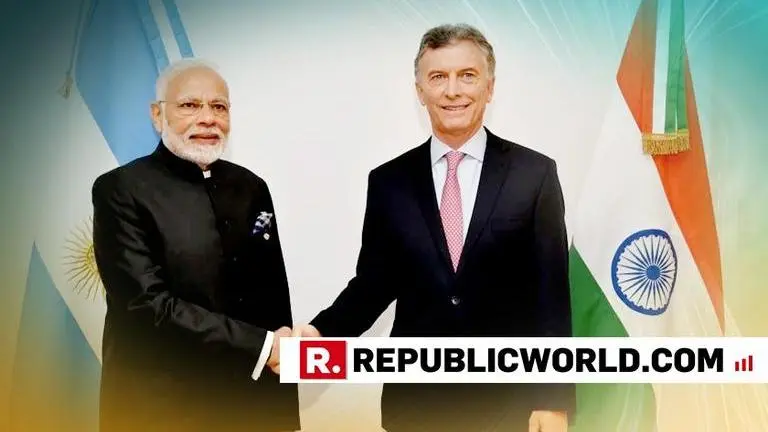Updated 1 December 2018 at 20:14 IST
PM Modi meets Argentinian President Mauricio Macri, discusses ways to strengthen bilateral ties
Prime Minister Narendra Modi on Saturday met Argentinian President Mauricio Macri and held extensive discussions on ways to strengthen bilateral ties and expand cooperation in areas like defence, nuclear energy, and agriculture.
- India News
- 0 min read

Prime Minister Narendra Modi on Saturday met Argentinian President Mauricio Macri and held extensive discussions on ways to strengthen bilateral ties and expand cooperation in areas like defence, nuclear energy, and agriculture.
The two leaders met over a breakfast hosted by Macri in a special gesture to Modi.
Modi also thanked the president for hosting the two-day G-20 summit. The G-20 is a grouping of the world's 20 major economies.
"Had a productive meeting with President @mauriciomacri. We had extensive discussions on ways to strengthen bilateral relations between India and Argentina. Also thanked President Macri for hosting a wonderful G-20 Summit," Modi tweeted after the meeting.
Advertisement
The prime minister also said he is looking forward to welcoming Macri in India.
External Affairs Ministry spokesperson Ravish Kumar also tweeted, "Starting the day on a bright note! In a special gesture, President of Argentina @mauriciomacri hosted PM @narendramodi over breakfast at his official residence. Good discussion on cooperation in agriculture & food processing, space, defence, oil & gas & civil nuclear energy."
Advertisement
Apart from holding bilateral and trilateral meetings on the sidelines of the G 20 summit in Argentina, Prime Minister Narendra Modi on Friday, November 30, (local time) presented a nine-point program to take action against fugitive economic offenders during his address in the second session of the ongoing G20 Summit in Argentina.
As part of the program, Prime Minister Modi suggested "strong and active" cooperation among the G-20 nations. He highlighted the importance of cooperation in legal processes such as "effective freezing of the proceeds of crime; early return of the offenders and efficient repatriation of the proceeds of crime should be enhanced and streamlined", so as to "deal comprehensively and efficiently with the menace of fugitive economic offenders".
He further suggested joint efforts to be made by the G20 nations to form a mechanism that denies entry and safe havens to all fugitive economic offenders. He stressed the "effective" implementation of the principles of the United Nations Convention Against Corruption (UNCAC) and the United Nations Convention Against Transnational Organised Crime (UNOTC). The Prime Minister underscored the need to implement features related to "International Cooperation" in the two conventions.
The Prime Minister said that the Financial Action Task Force (FATF) should be called upon "to assign priority and to focus on establishing international co-operation that leads to a timely and comprehensive exchange of information between the competent authorities", adding that the FATF should be tasked to formulate a standard definition of fugitive economic offenders.
(with inputs from PTI)
Published By : Digital Desk
Published On: 1 December 2018 at 20:06 IST
